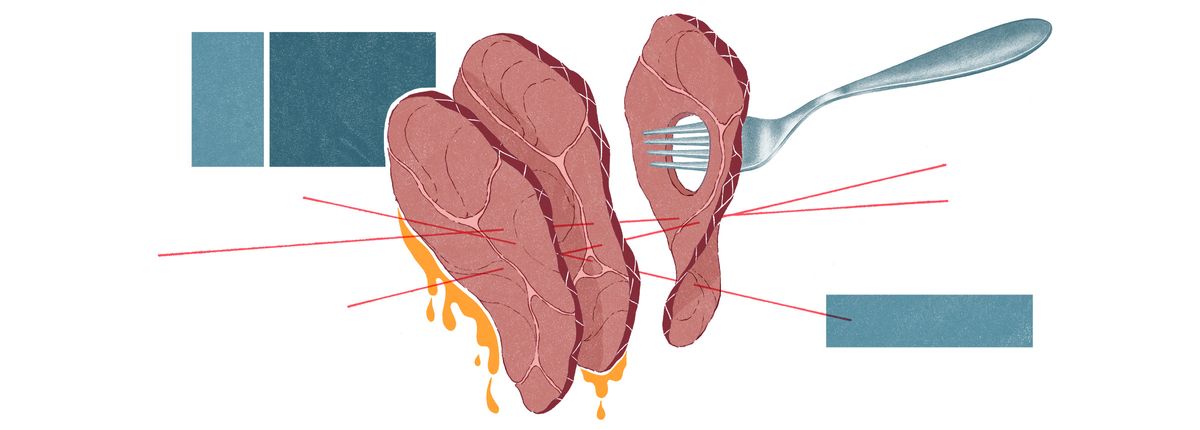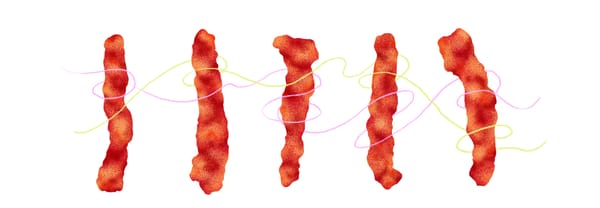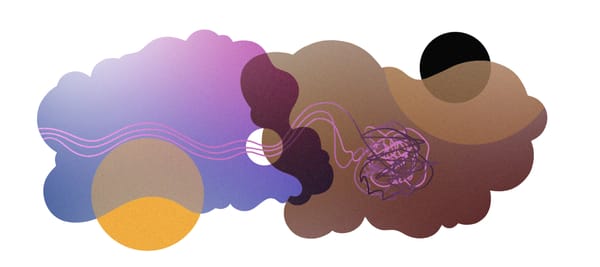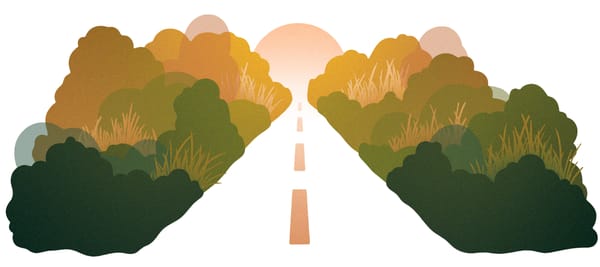Glazed Ham, April 1996
by Todd Kliman | A gleaming source of guilt.

“So, how not-religious are we talking about?” I ask my girlfriend—joking, I think.
“Very not,” she says, but the undercurrent of anxiety in my question has already entered her and she returns serve with one of her own: “Why?”
This is early in our time together, in the first heady months when we’re still getting to know each other, and the fact of our being an interfaith couple seems like just one more stylistic difference. She likes opera; I like jazz. She likes old movies; I like foreign films. She likes staying in; I like going out.
Her being not-Jewish, in other words, is really no big deal, nothing to come between us, certainly, and yet here we are, Ellen and I, four months later and six weeks before Christmas, sitting on the floor of my apartment one night after dinner, enmeshed in earnest, searching discussion, staking out our territories, and growing more fraught by the minute.
There is one thing we agree on, and that is just how perplexed and disturbed we both are by the newfound edge in our voices. One minute we are on a romantic stroll, the next we have wandered into a dark and tangled forest.
In the days after this lurching turn into our histories, into history, it is clear that something has shifted between us, that the foundation beneath us is more porous than it seemed. Before, we were a carefree young couple. Now, suddenly, we are a couple in a relationship.
In the anxious final weeks before Christmas, our earnest and searching conversations move from the purely theoretical to the imminently practical, and it is clear who is the holdup to meaningful progress in our pursuit of domestic harmony.
Why should I be so freaked out about the possibility of stepping into a church pew with her? Why should talking about a hypothetical Christmas tree in our hypothetical home send me into a deep and spiraling funk?
~~~
The big night turns out not to be. A big family dinner, just as she promised, undeserving of even one of my nights of sleepless angst. No caroling, not even a single rendition of “Jingle Bells.” The anticlimax is a blessing, and I am grateful for that, but it’s also what leaves me so unprepared, four months later, for my first Easter dinner.
“It’s just dinner,” Ellen insists. “Just like Christmas.”
Just dinner, until the moment her mother emerges from the kitchen with a gold-trimmed platter bearing a glazed ham.
The mere sight of it—massive, gleaming, a triumphant assertion of porkiness—unnerves me. With a ham sandwich, the meat shaved and hidden between two pieces of white bread, I could convince myself that I was just eating a kind of saltier, richer turkey.
This is ham. There is no escaping what it is. No way to rationalize it as anything other than the high treyf that it is.
“High treyf” is not part of Jewish tradition. There’s no category in the rituals of kashrut for it. It belongs to my own tortured system of self-justification, a system I devised long ago to assuage my guilt at eating what I want, in which a whole lobster is high treyf, because the violation is plain for all to see, while a lobster roll is low treyf, the symbol of transgression chopped up and mixed with mayo and rendered all but undetectable to the scrutinizing eye.
A glazed ham? Not just high treyf, but the highest. What could be more symbolic, more egregiously contrary, than a monstrous rump of pork?
~~~
In Leviticus, the Hebrews were warned away from the consumption of pork with these grave words: “And the swine, because he parteth the hoof, and is clovenfooted, but cheweth not the cud, he is unclean unto you.”
If it were merely a dietary suggestion, it would not have endured for more than two millennia, and with such tenacity. It endures because it is a means of perpetuating the us vs. them binary that is essential to the perpetuation of Judaism. Pork is for them, not for you. And more—and worse: certain disaster awaits our fragile and oppressed tribe, should any of our members exhibit weakness and indulge.
This guilting, this fear, runs unvaryingly through the centuries, and extends even to the idea of eating itself—or at least to eating with pleasure.
The Hebrew term for heretic is epikoros, a direct reference to the great philosopher Epicurus, who disdained systems of rewards and punishments and advocated for pleasure. In the Mishnah, which turned Jewish oral traditions into writing, an epikoros is one who does not have a share in the world to come.
~~~
“You eat ham, right, Todd?” her mother asks, her tone kindly and hopeful, as her father takes up his long knife.
I don’t know whether to be pleased that she’s thought to acknowledge my difference from the family, or displeased that she’s called attention to what, exactly, about me doesn’t fit.
I nod dumbly, and she smiles, and now an altogether different emotion steals upon me—anger and shame that I have assented to being, of all things, a ham-eater; that I have declared myself with them.
I watch the slices of ham fall away from the knife, thick and pink and glistening.
“Todd, one slice or two?” her father says.
I am not just staring at a ham. I am staring at a line.
“One,” I say.
He lays two on my plate, then goes back and spears a third. “You’re a growing boy,” he cracks.
Each bite is so irresistibly rich and delicious. Glazed ham is to the ham sandwich what chateaubriand is to the Quarter Pounder. I can’t stop eating.
Nor can I stop thinking about the ancients, who reserved a special scorn for gluttony, because if a person could not exercise restraint over his appetites, then there was no telling what other crimes he might be capable of committing. Gluttony could lead to sloth, to lust, to avarice, to envy, to pride, to wrath.
I don’t just have seconds, I have thirds—my guilt, my shame, overpowered by the greater forces of hunger, just as the differences between Ellen and me are not so much resolved as relegated, in the way that need, that lust, has a way of making the practical seem soul-diminishing.
A year and a half later, we stand under a chuppah, with a rabbi and a minister. My parents, though not exactly pleased that I have violated the cultural injunction not to marry outside the faith (a familial injunction, too, but, because they’re tolerant, open, pork-eating people, a lightly voiced one), are not exactly unpleased. My guilt is at least partially mollified by the semi-Jewish ceremony.
I am happy. My wife is happy. We are happy together. But in the early, easygoing years of our marriage, I am not ignorant of the high-treyf crime I have committed in coloring outside the lines, and for the same reason I returned for thirds of the ham: because I couldn’t help myself.
Todd Kliman is an author, essayist, food writer, and teacher. He is the recipient of two James Beard Awards, including the M. F. K. Fisher Distinguished Writing Award. His work has appeared in the New Yorker, Harper’s Magazine, the Oxford American, Lucky Peach, the Daily Beast, the Washington Post Magazine, and NPR online, among others, and has been widely anthologized, including seven times in the Best Food Writing series. “Glazed Ham, April 1996” is an excerpt from a new book, “Mouth/Feel: A Vulnerable Consumption of the World, in 33 Meals.” More at toddkliman.net.
A version of this essay originally appeared in Lucky Peach.
Support our efforts: ☕ buy us a coffee.






